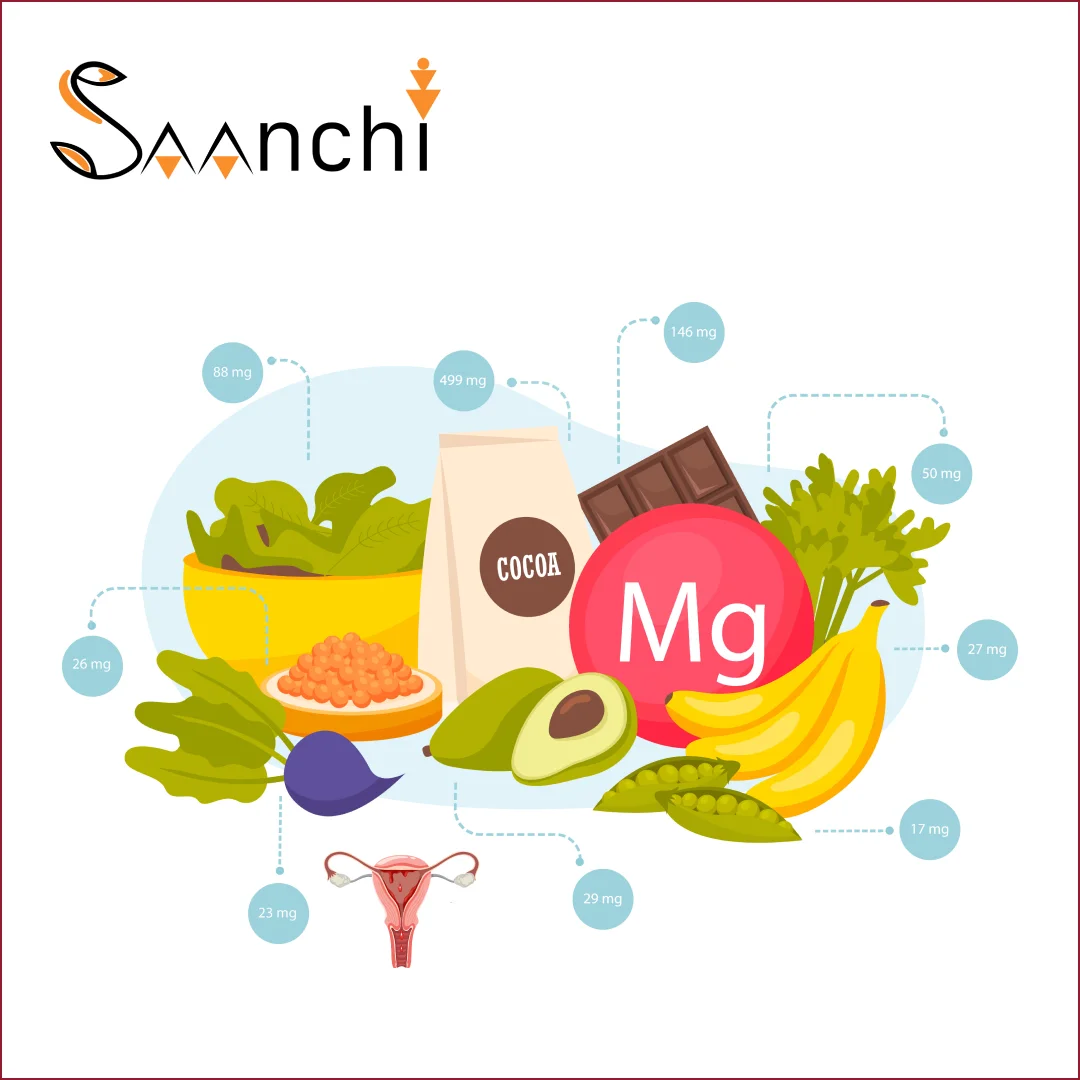Magnesium is often called the “miracle mineral” because of its numerous health benefits, but few people realize the crucial role it plays in supporting menstrual health. For women who experience menstrual discomfort, including cramps, mood swings, and fatigue, ensuring adequate magnesium intake may help alleviate some of these symptoms. This article dives deep into the significance of magnesium for menstrual health, how it works, and how you can incorporate it into your diet for a smoother menstrual experience.
Why Magnesium is Important for Menstrual Health
Magnesium is a vital mineral that is involved in over 300 biochemical reactions in the body, including regulating muscle and nerve function, blood sugar levels, and blood pressure. When it comes to menstrual health, magnesium plays an essential role in balancing hormones, reducing inflammation, and helping the body manage stress, all of which can directly impact the severity of menstrual symptoms.
For women, maintaining a healthy balance of magnesium can significantly improve their overall well-being, particularly during the menstrual cycle. Low magnesium levels are often linked to common premenstrual syndrome (PMS) symptoms such as cramps, headaches, fatigue, and mood swings. Women who frequently suffer from painful periods may benefit from increasing their magnesium intake to help ease these symptoms.
- Magnesium’s Effect on Menstrual Cramps
One of the most common complaints during menstruation is the painful cramps caused by the uterus contracting to shed its lining. Magnesium can help relax the smooth muscle of the uterus, preventing these severe contractions and therefore reducing pain. Studies suggest that women who experience menstrual cramps may have lower magnesium levels compared to those who don’t.
Magnesium works as a natural muscle relaxant, helping the uterine muscles relax, which can alleviate the intensity of menstrual cramps. Increasing your magnesium intake through supplements or magnesium-rich foods can provide relief from period pain and improve comfort during your cycle.
- Magnesium and Mood During the Menstrual Cycle
Fluctuating hormone levels can cause mood swings, anxiety, and irritability in many women leading up to and during their periods. Magnesium is known to play a role in brain function and mood regulation by influencing neurotransmitters such as serotonin, which contributes to feelings of well-being.
Low levels of magnesium are linked to increased feelings of anxiety, stress, and depression. Women who experience severe mood swings as part of PMS or PMDD (Premenstrual Dysphoric Disorder) may find that boosting magnesium intake can help stabilize their emotions. Incorporating magnesium into your daily routine can reduce the impact of these mood swings, leading to a more balanced emotional state during menstruation.
- Reducing Water Retention and Bloating with Magnesium
Bloating and water retention are common menstrual symptoms that can cause discomfort and a feeling of heaviness. Magnesium helps regulate fluid balance in the body, which can prevent water retention and reduce bloating. By improving circulation and aiding in the regulation of sodium levels, magnesium can help women feel lighter and more comfortable during their periods.
This is particularly helpful for women who struggle with premenstrual bloating, as magnesium’s ability to regulate fluids can significantly reduce swelling and discomfort.
- Magnesium and Fatigue
Fatigue is another common symptom experienced by many women before and during their periods. The body works harder during menstruation, and as a result, it requires more energy. Magnesium helps convert food into energy, making it a key player in combating period-related fatigue.
Low magnesium levels can lead to decreased energy production, leaving you feeling sluggish and tired. Ensuring you get enough magnesium through foods such as leafy greens, nuts, and whole grains can help maintain your energy levels during your menstrual cycle.
- Foods Rich in Magnesium for Menstrual Health
The easiest way to increase your magnesium intake is through diet. Many magnesium-rich foods are easily accessible and can be incorporated into your meals. Some of the best sources of magnesium include:
- Leafy greens: Spinach, kale, and Swiss chard
- Nuts and seeds: Almonds, pumpkin seeds, and sunflower seeds
- Whole grains: Brown rice, quinoa, and oats
- Legumes: Black beans, lentils, and chickpeas
- Fish: Salmon and mackerel
- Dark chocolate: (A healthy indulgence!)
In addition to these foods, magnesium supplements are also an option, but it’s always a good idea to consult with a healthcare professional before starting any new supplements, especially if you’re targeting specific menstrual symptoms.
- Magnesium Deficiency and Menstrual Health
If you’re not getting enough magnesium from your diet, you may be at risk for magnesium deficiency, which can exacerbate menstrual symptoms. Signs of magnesium deficiency include muscle cramps, fatigue, headaches, and even anxiety. Women with magnesium deficiency may find that their PMS symptoms, such as bloating, irritability, and cramps, worsen.
If you suspect you may have low magnesium levels, a simple blood test can confirm it. Increasing your magnesium intake through diet or supplements can have a positive effect on both your overall health and your menstrual health.
- How Much Magnesium Should You Take?
The recommended daily intake of magnesium for women is around 310-320 milligrams, but this can vary depending on age, activity level, and overall health. If you are considering taking magnesium supplements to improve your menstrual health, a healthcare provider can help you determine the appropriate dosage for your specific needs.
Remember, more isn’t always better—taking too much magnesium can lead to digestive issues, including diarrhea. Balance is key when introducing any new supplement into your routine.
Conclusion
Magnesium plays a pivotal role in maintaining menstrual health by alleviating cramps, reducing bloating, balancing mood swings, and combating fatigue. By ensuring adequate magnesium intake through diet or supplements, women can manage their menstrual symptoms more effectively and improve their overall well-being. As more women become aware of the benefits of magnesium, it has the potential to become an essential tool in menstrual health management.


